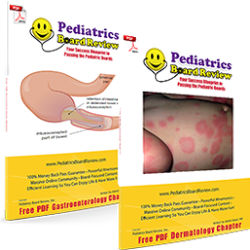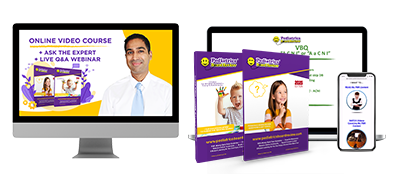Top 7 Mistakes to Avoid When Preparing for the Pediatric Boards
Preparing for the pediatric boards can feel overwhelming. I remember vividly the pressures and stress surrounding exam preparation. But through trial and error and ultimate success, I've learned that with the right approach, it doesn't have to be that way. Whether you're tackling the boards for the first time or are re-taking the test, many of us slip into common bad habits that can derail our progress.
Let's talk about the most frequent mistakes I see pediatricians make when studying, and how to avoid them so you can move toward your certification with confidence and clarity. After struggling with the pediatric boards myself, I developed strategies that helped me, and have now helped thousands of others, navigate the process confidently. Once I built up this confidence, it made a world of a difference for me and it can do the same for you.
1. Underestimating the Exam's Scope
The pediatric boards span a vast range of topics, from common issues to rare conditions you might hardly encounter in practice. The fear of the unknown often propels doctors to check several resources. They end up being Jacks and Jills of all trades, but masters of none. I underestimated this phenomenon myself the first time around, and I failed. So, focus on a single, high-yield resource such as PBR.
How to Avoid It
- Don't study off the exam ABP content outline: Studying off the content outline can distract you from focusing on all of the core content.
- Use High-Yield Resources: Stick with proven resources emphasizing concise, high-yield content, like PBR's study materials, which are structured specifically around high-yield topics. Avoid cramming random facts from multiple sources; instead, go deep on core content that has been proven to generate powerful results. Through repetition and reinforcement, you can master the material and pass your exam.
- Plan Smartly and Use Your Time Wisely: Create a realistic schedule that allows you to revisit key areas multiple times. Focus on information that's key for you, not the topics that you are already familiar with. Instead, focus on what you're struggling with. One way you can achieve this is through my highlighter strategy by using several colors and using a different one in every round so you can focus and cut down on how much of the book you have to go through.
- Assess Your Risk of Failing: If you want to find out if you are a low-risk or high-risk test taker, check out PBR's risk calculator to see. Depending on where you fall on the scale, you can gauge how many hours you will have to invest and plan.
2. Procrastination and Poor Time Management
Procrastination is one of the biggest obstacles pediatricians face when studying for the boards. Many feel overwhelmed and delay starting, hoping for a better time to begin. However, this creates a rushed, high-pressure scenario that sacrifices comprehension and retention. In many cases, this leads to last-minute cramming, which may seem tempting at first glance but often is ineffective. There's simply too much information to retain that way, and cramming can lead to burnout, which is an all-too-common experience for those in our field.
How to Avoid It
- Start Early and Stick to It: It's a marathon, not a race. Taking action now and having consistency over months will serve you better than any last-minute push. Set aside regular blocks of time, even if they're short. The number of hours you have to map out depends on your risk profile. So assess your risk of failing and figure out if you have to go over the course materials at least three times or at least five times. This is crucial to properly mapping out your study schedule.
- Set Realistic Goals: Depending on your risk profile, you may need 300 hours of board preparation or you may need 600 hours, so knowing your risk profile is critical.
- Leverage Active Learning: Techniques like summarizing in your own words, teaching what you've learned to a peer, spaced repetition, or using my highlighter method help information “stick” better.
3. Strictly Learning Off of Questions
One of the most common mistakes I see is using questions to study, which is almost as big of a mistake as ignoring how to process questions. Knowing the material is one thing; being able to apply it under exam conditions is another, and you should not be trying to build your fund of knowledge from question banks.
How to Avoid It
- Focus Your Time: Instead of focusing on test questions, which can lead to information overwhelm and content issues, use your time wisely as you go through your core content.
- Stay Committed: Build a study schedule and stick to it. Do anything you need to do to secure the 3 pillars of board preparation, including the medical content, test-taking strategy, and the commitment to make your board preparation a high priority.
- Build Test-Taking Strategies: Use questions strategically to hone your skill of test-taking rather than using them to study. Once you actually develop test-taking strategy, then it's time to practice those strategies on every board-style question you come across to increase your chances to get them right.
- Simulate Exam Conditions: Block off time for full-length, timed exams. Practicing under pressure will prepare you for the real thing and allow you to optimize your day and be the best version of yourself.
4. Ignoring Test-Taking Strategies
This is huge. Test-taking isn't just about what you know but it's about how you approach each question. Effective strategies can make or break your performance; I've seen many pediatricians overlook this aspect.
How to Avoid It
- Build Test-Taking Strategies: Use easily available question banks to practice test-taking skills and strategies. Learn about the exam structure and how many minutes you have per question and build a strategy around that so you can properly pace yourself.
- Use Different Techniques: Is it better to work from a selection perspective to predict which answr is right or to work more from an elimination standpoint? There is a right answer to this question, but you won't know the answer until you try both, or go through one of PBR's test-taking strategies course. There are many reasons that PBR is known as the best pediatric board review course, and our focus more than just the subject matter is one of those key reasons.
- Manage Anxiety: Anxiety can be a huge hurdle. It can make your brain short-circuit and answer questions wrong you normally would have gotten right. Take advantage of relaxation techniques like deep breathing and visualization to get yourself out of an anxious state or to prevent entering one.
*CTA button goes here* for test-taking strategy course
5. Setting Unrealistic Study Schedules
I've often heard from doctors who set ambitious study schedules that look great on paper but don't account for real-life demands. This can lead to burnout or a feeling of “always being behind.”
How to Avoid It
- Be Realistic: Factor in all your commitments, work, family, and self-care, and set a schedule you can stick with consistently.
- Break Down Chapters and Core Content: Rather than tackling large sections, break chapters and your core content into smaller, manageable pieces. Map out your schedule based on how many hours you have in a given day to know which page to reach on every study day. Or, let Team PBR create a personalized study schedule for you!
- Build in Flexibility: Life happens. Schedule “catch-up” days so that you won't fall off track if something unexpected comes up.
6. Sacrificing Self-Care for Study Time
Sleep, nutrition, and exercise are often neglected in the rush to prepare. This can easily lead to burnout. I've been there myself, but neglecting self-care is counterproductive.
How to Avoid It
- Prioritize Sleep: Aim for 7–8 hours per night. A well-rested mind retains information better and performs more effectively under pressure.
- Stay Active: Even short workouts can boost mental clarity and reduce stress, making your study sessions more productive.
- Eat Well: Balanced nutrition fuels your brain. To keep your energy levels up, try to maintain a steady intake of healthy proteins, whole grains, and vegetables.
7. Being Too Proud to Ask for Help
Preparing for the boards alone is challenging, and it can also create barriers that are difficult to get past in isolation.
How to Avoid It
- Form a Study Group: Joining a study group can provide support, clarify challenging concepts, and help with accountability.
- Join a Community: Build a network through PBR's private online community of your peers. You can also reach out to the PBR content experts through our “Ask the Expert” portals or attend one of our live webinars to ask questions and build this network.
- Use a Board Review Course: Go through a targeted board review course that specifically focuses on helping you pass and offers support along the way. PBR's resources, for instance, emphasize high-yield topics and memory aids specifically for board exams, and PBR's personalized support is unparalleled in the world of medical board review.
- Seek Mentorship: Colleagues, mentors, and PBR alumni in our online community who have excelled at the boards can offer valuable insights and encouragement.
FREE STRATEGIES
My Journey: Why I'm Here to Help You Succeed
My journey to this point hasn't been easy, and that's exactly why I'm here to help.
Years ago, I faced the stress and frustration of failing the pediatric boards, the first major exam I'd ever failed. It was a wake-up call that pushed me to completely overhaul how I studied. With a fresh approach, I increased my score by 40% and not only passed but was invited by the American Board of Pediatrics to help write their exam questions. That moment inspired me to create PBR, a resource I wish I had during my own journey.
Now, I get to do what I truly love: helping others pass the boards and regain control of their careers. Over the years, I've guided thousands of pediatricians to success. Whether you're a first-time test-taker or someone who's failed multiple times, I've designed PBR to simplify the overwhelming process of studying, focusing only on the material and strategies that matter most.
I understand how high the stakes are for you. If you're ready to approach this challenge with the right tools, mindset, and support, my team and I are here to guide you every step of the way.
A Smarter Path to Success with Pediatrics Board Review
Passing the pediatric boards requires more than just mastering content. It's about creating a study plan that balances preparation with self-care and uses proven resources tailored to your needs. I built Pediatrics Board Review from my own experience, focusing on high-yield material and strategies that help you retain and recall crucial information. PBR is here to support you every step of the way with a proven framework designed to help you make the most of your study time and reach your goal of board certification.
If you're ready to move forward with confidence, PBR offers the high-yield resources and structured approach you need to pass the boards and take the next step in your career. Let's tackle this journey together. Contact my team today and find out how we can help you succeed.
Pediatrics Board Review is your all-in-one study service guide designed for pediatricians by board-certified pediatricians. Dr. Ashish Goyal has been helping pediatricians pass their initial certification exams and maintenance of certification exams since 2011. Have questions? Click here to contact our team for answers.




